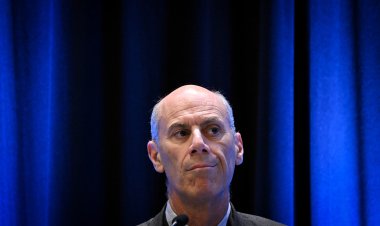Biden signs law bringing rail strike saga to an end
But Democrats rankle some members of their party for not including paid sick leave.

President Joe Biden on Friday signed legislation to bring to a close any threat of a rail strike by enshrining into statute a contract between labor unions and the freight rail industry.
That closes out months of chaotic negotiations that brought the nation to the brink of a rail shutdown that could have decimated the economy. But in so doing, Democrats have angered one of their key political constituencies and rankled members of their own party for not including paid sick leave for more than 100,000 workers that had threatened to strike.
Biden said he was compelled to act because a work stoppage "without a doubt would have been an economic catastrophe at a very bad time in the calendar."
Biden’s signature ensures that critical goods like drinking water, agriculture and energy shipments can stay on freight rail lines and keep the supply chain intact. Absent a deal, those goods were at risk of having to be diverted in the days leading up to a Dec. 9 date on which a strike could have commenced.
“Our nation's rail system is literally the backbone of our supply chain," he said during the signing ceremony. "So much of what we rely on is delivered on a rail. From clean water to food and gas ... without freight rail many of the U.S. industries would literally shut down."
The high-profile standoff centered on rail workers’ desire for additional paid sick leave and unions’ inability to get rail operators to budge on the issue.
Railroads argued that the contracts already offer generous paid time off and other provisions available if workers fall ill, but rail employees countered that those policies require advance notice that isn't feasible in common situations like having to take a sick child to the doctor unexpectedly.
The president acknowledged those concerns and maintained that he supports continuing to work to ensure employees have those benefits.
“We still have more work to do in my view in terms of ultimately getting paid sick leave, not just for rail workers but for every worker in America," Biden said. "I supported paid sick leave for a long time, and I'm going to continue that fight until we succeed."
Biden’s measured tone following several days of frenzied activity in Congress stands in stark contrast to the victory lap the White House took in mid-September when his administration brokered a deal to avert the threat of an earlier work stoppage. At the time, the administration even went so far as to taunt the opinion page of The Wall Street Journal from Biden’s presidential Twitter account after it published an editorial questioning how he handled the rail negotiations.
But after four of the 12 labor unions — representing more than half of the workforce — at the bargaining table rejected their proposed contracts, the Biden administration raced to reach a resolution as the specter of a pre-holiday strike loomed.
Biden’s decision Monday evening to throw the issue to Congress kicked off a whirlwind three days that scrambled partisan fault lines on Capitol Hill.
He even deployed two Cabinet members — Labor Secretary Marty Walsh and Transportation Secretary Pete Buttigieg — on Thursday to sell Senate Democrats on voting to prevent a work stoppage and impose the rail deal minus the sick leave workers wanted.
The House pushed through a pair of votes, one granting seven days of paid sick leave and the other on the underlying contract. The two-step maneuver was initiated by House Speaker Nancy Pelosi in response to consternation from her Democratic Caucus about forcing a contract on workers that they had already rejected.
However there was not enough support in the Senate for the sick leave component to clear a 60-vote requirement and the base bill passed without it. (A Republican effort to extend the no-strike period also failed.)
Biden credited legislators for acting quickly, while acknowledging that it was "tough vote for members of both parties."
"But it was the right thing to do at the moment to save jobs, to protect millions of families from harm and disruption and to keep supply chains stable through the holidays," the president said.












